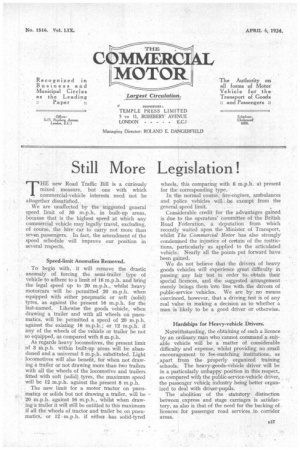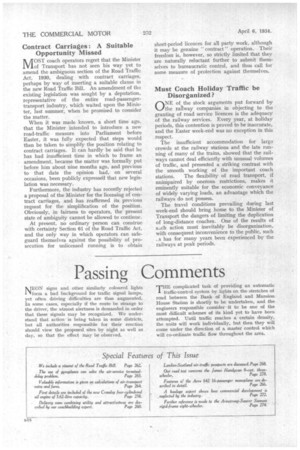Still More Legislation !
Page 35

Page 36

If you've noticed an error in this article please click here to report it so we can fix it.
THE new Road Traffic Bill is a cUriously mixed measure, but one with which , commercial-vehicle interests need not be altogether dissatisfied.. , We are unaffected by the Suggested general speed limit of 30 m.p.h. in built-up areas, because that is the highest speed at which any commercial vehicle may legally travel, excluding, of course, the hire car to carry not more than seven-passengers. In fact, the amendment of the speed schedule will improve our ' position in several respects, Speed-limit Anomalies Removed.
To begin with, it will remove the drastic anomaly of forcing the semi-trailer type of vehicle to adhere to a limit of 16 m.p.h. and bring the legal speed up to 20 m.p.h., whilst 'heavy motorcars will be permitted 20 m.p.h. when equipped with either pneumatic or soft (solid) tyres, as against the present 16 m.p.h. for the last-named. Likewise the goods vehicle, when drawing a trailer and with all wheels on pneumatics, will be permitted a speed of 20 m.p.h. against the existing 16 m.p.h.; or 12 m.p.h. if any of the wheels of the vehicle or trailer be not so equipped, as compared with 8 m.p.h. As regards heavy locomotives, the present limit of 3 m.p.h. within built-up areas will be abandoned and a universal 5 m.p.h. substituted. Light locomotives will also benefit, for when not drawing a trailer or not drawing more than two trailers with all the wheels of the locomotive and trailers fitted with soft (solid) tyres, the maximum speed will be 12 m.p.h. against the present 8 m.p.h.
The new limit for a motor tractor on pneumatics or solids but not drawing a trailer, will be 20 m.p.h. against 16 m.p.h., whilst when drawing a trailer it will still be entitled to this maximum if all the wheels of tractor and trailer be on pneumatics, or 12 m.p.h, if either has solid-tyred wheels, this comparing with 8 m.p.h. at present for the corresponding type.
In the normal course, fire-engines, ambulances and police vehicles Will be exempt from the general speed limit.
Considerable credit for the advantages gained is due to the operators' committee of the British Road Federation, a deputation from which recently waited upon the Minister, of Transport, whilst The Comm:beret:a Motor has also strongly condemned the injustice of Certain of the restrictions, particularly as applied to the articulated vehicle. Nearly all the points put forward have been gained.
We do not believe that the drivers of heavy goods vehicles will experience great difficulty in passing any fair test in order to obtain their speeial licences, and the suggested arrangement merely brings thern into line with the drivers of public-service vehicles. We are by no means convinced, however, that a driving test is of any real value in making a decision as to whether . a man is likely to be a good driver or otherwise.
Hardships for Heavy-vehicle Drivers.
Notwithstanding, the obtaining of such a licence by an ordinary man who 'cannot command a suitable vehicle will be a matter of considerable difficulty and expense, whilst providing no small encouragement to fee-snatching institutions, as _,apart from the properly organized training schools. The heavy-goods-Vehicle driver will be in a particularly unhappy position in this respect, as compared with the public-service-vehicle driver, the passenger vehicle industry being better organ ized to deal with drNer-pupils. • The abolition of the statutory distinction .between , express and stage carriages is satisfactory, as also is that of the need for the backing of licences for passenger road services in corridor areas.
Contract Carriages: A Suitable Opportunity Missed
40ST coach operators regret that the Minister 1 V lof Transport has not seen his way yet to amend the ambiguous section of the Road Traffic Act, 1930, dealing with contract carriages, perhaps by way of inserting a suitable clause in the new Road Traffic Bill. An amendment of thc existing legislation was sought by a deputation, representative of the entire road-passengertransport industry, which waited upon the Minister, last summer, when he promised to consider the matter.
When it was made known, a short time ago, that the Minister intended to introduce a new road-traffic measure into Parliament before Easter, it was fully expected that steps would then be taken to simplify the position relating to contract carriages. It can hardly be said that he has had insufficient time in which to frame an amendment, because the matter was formally put before him about nine months ago, and previous to that date the opinion had, on several occasions, been publicly expressed that new legislation was necessary.
Furthermore, the industry has recently rejected a proposal of the Minister for the licensing of contract carriages, and has reaffirmed its previous request for the simplification of the position. Obviously, in fairness to operators, the present state of ambiguity cannot be allowed to continue.
At present, no ordinary person can construe with certainty Section 61 of the Road Traffic Act, and the only way in which operators can safeguard themselves against the possibility of prosecution for unlicensed running is to obtain short-period licences for all party work, although it may be genuine " contract " operation. Their freedom is, however, so strictly limited that they are naturally reluctant further to submit themselves to bureaucratic control, and thus call for some measure of protection against themselves.
Must Coach Holiday 'Traffic be Disorganized ?
ONE of the stock arguments put forward by the railway companies in objecting to the granting of road service licences is the adequacy of the railway services. Every year, at holiday periods, this contention is proved to be inaccurate, and the Easter week-end was no exception in this respect.
The insufficient accommodation for large crowds at the railway stations and the late run-1 fling of many of the trains, showed that the railways cannot deal efficiently with unusual volumes of traffic, and presented a striking contrast with the smooth working of the important coach stations. The flexibility of road transport, if unimpaired by onerous restrictions, makes it eminently suitable for the economic conveyance of widely varying loads, an advantage which the railways do not possess.
The travel conditions prevailing during last week-end should bring home to the Minister of Transport the dangers of limiting the duplication of long-distance coaches. One of the results of such action must inevitably be disorganization, with consequent inconvenience to the public, such has for many years been experienced by the railways at peak periods.




































































































